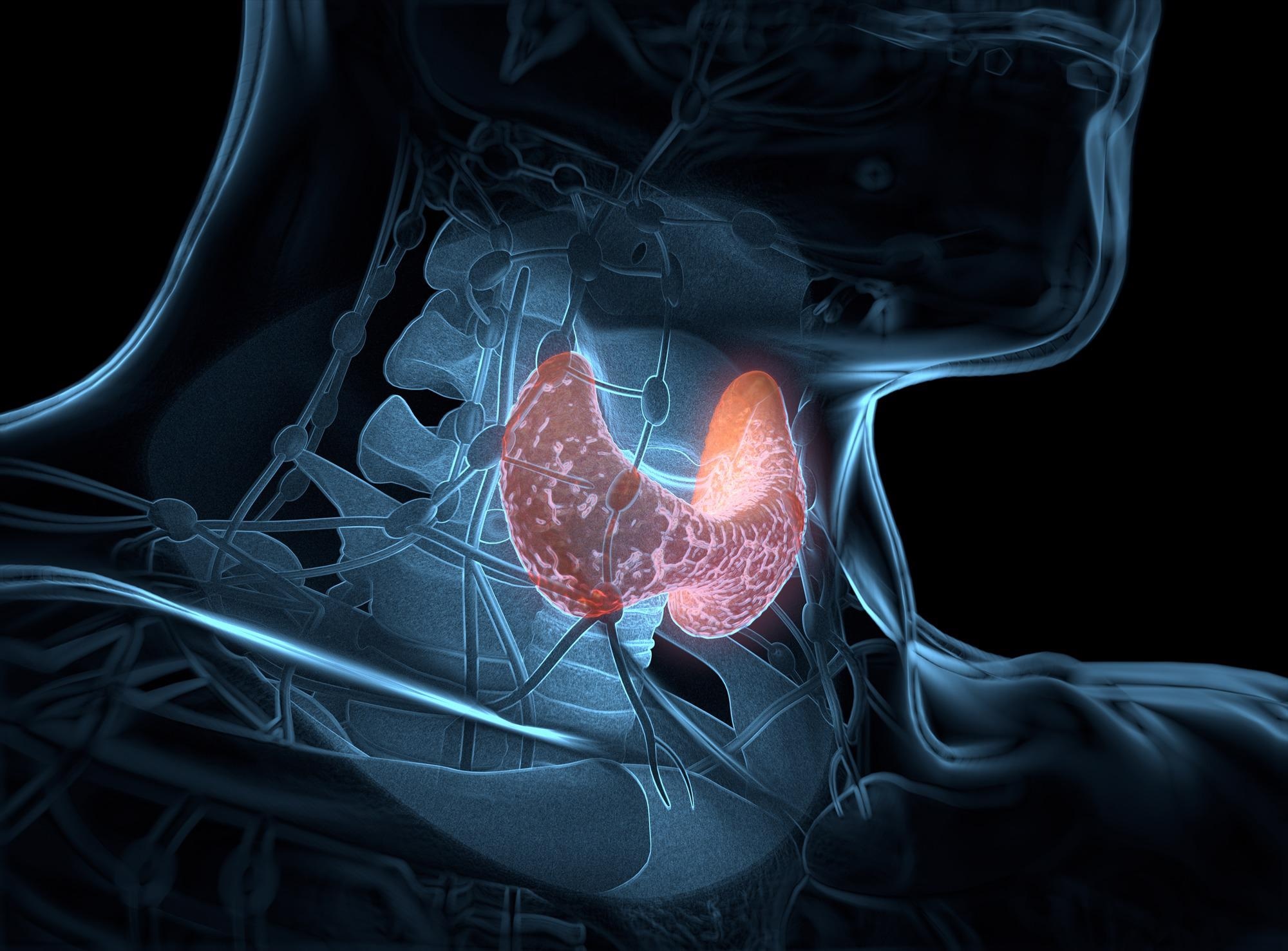Study looks at potential impact of BBIBPCorV and CoronaVac SARS-CoV-2 vaccines on thyroid
In a recent study posted to Preprints with The Lancet* server, a team of researchers from China performed a serology study of thyroid function and antithyroid antibody levels in severe acute respiratory syndrome coronavirus 2 (SARS-CoV-2)-vaccinated recipients and further evaluated their correlation with SARS-CoV-2 neutralizing antibodies (NAbs) levels.
To date, SARS-CoV-2 has infected over 411 million people worldwide. Various SARS-CoV-2 vaccines have been developed, and they are one of the most widespread and vital measures to combat the coronavirus disease 2019 (COVID-19) pandemic. Despite the popularity of SARS-CoV-2 vaccines, their safety in many populations has been widely debated.
Limited evidence is available for SARS-CoV-2 vaccines’ impact on thyroid function, and identifying and monitoring the effect of the vaccines on thyroid function is crucial for people living with thyroid disorders.
 Study: Effect of Inactivated SARS-CoV-2 Vaccine on Thyroid Function and Autoimmunity. Image Credit: Anatomy Image
Study: Effect of Inactivated SARS-CoV-2 Vaccine on Thyroid Function and Autoimmunity. Image Credit: Anatomy Image
Study design
In this research work, the researchers performed a randomized controlled trial and a prospective cohort study in Sun Yat-sen University Hospital, China, between 15 April 2021 and 28 April 2021, and between 8 May 2021 and 30 June 2021, respectively. All participants received BBIBP-CorV (Sinopharm, Beijing) or CoronaVac (Sinovac Life sciences, Beijing) inactivated SARS-CoV-2 vaccine at day 0 and day 28. From each participant, samples were collected before the first dose and after 28 days of the second dose.
Serum levels of thyroid-stimulating hormone (TSH), total thyroxine (TT4), free triiodothyronine (FT3), total triiodothyronine (TT3), free thyroxine (FT4), antithyroid peroxidase antibody (TPOAb), and anti-thyroglobulin antibody (TgAb) were measured by chemiluminescent immunoassays (CLIA). TSH receptor antibody (TRAb) levels were estimated by electrochemiluminescence immunoassays. Serum levels of SARS-CoV-2 Nabs were also determined by CLIA. The researchers applied Spearman correlation to determine the correlation between thyroid function and levels of antithyroid and SARS-CoV-2 Nabs antibodies.
Findings
The researchers observed that 6.38% of participants with regular baseline thyroid function developed thyroid disorder post-SARS-CoV-2 vaccination with indicators of highest abnormal thyroid function were TSH (3.02%), TT4 (2.88%), and FT3 (1.30%). At baseline, a total of 545 recipients were negative for three antithyroid antibodies tested and post-vaccination, no recipients showed the development of abnormal antibodies. In addition, the researchers observed that >99% of recipients with negative TPOAb, TgAb, or TRAb at baseline maintained optimal range of the corresponding antibody, while only three recipients had slightly elevated TPOAb or TRAb levels.
Out of the 93 recipients with baseline thyroid dysfunction, 75.27% retained normal thyroid function post-vaccination and the indicators of the highest normal rate in descending order were FT4, TT3, and FT3. Post-SARS-CoV-2 vaccination, the majority of recipients tested positive for antithyroid antibodies at a rate of 96.2% with abnormal TPOAb values and 88.31% with abnormal TgAb values at baseline. However, a decrease in TgAb level was observed in more than half of these recipients. Post-vaccination, a decrease in abnormal levels of TRAb was observed in 11 recipients, while 63.4% became negative for antithyroid antibodies.
The researchers revealed that pre-and post-vaccination, no correlation was observed between thyroid function parameters, levels of autoantibody, and SARS-CoV-2 NAb titers after 28 days of the second dose. However, there was a mild correlation in TT3, TT4, and TgAb levels pre-vaccination and TT4 levels post-vaccination with SARS-CoV-2 antibody titers with a correlation coefficient of 0.09, 0.09, 0.08, and 0.10, respectively.
Conclusion
This study showed that vaccination with SARS-CoV-2 inactivated vaccine had no severe impact on thyroid function or antithyroid antibodies in recipients with normal thyroid function. However, in recipients with abnormal thyroid function or autoimmunity, a mild aggravation of thyroid function in only a few recipients was seen, with some even showing an improvement.
The study data suggested a limited correlation between thyroid function and antithyroid antibody level pre- and post-SARS-CoV-2 vaccination.
This research provides evidence-based support for the clinical application of SARS-CoV-2-inactivated vaccines in patients with thyroid disorders. However, this study has some limitations. Only SARS-CoV-2-inactivated vaccines were considered in the study, as messenger ribonucleic acid (mRNA) vaccines have not been approved in China. Also, monitoring of thyroid function and levels of antithyroid antibody were performed, but no observations were done involving short-term fluctuations of thyroid status. The researchers warrant the need for further research to assess the effect of different SARS-CoV-2 vaccines at different time points on thyroid function post-vaccination.
*Important notice
Preprints with The Lancet publish preliminary scientific reports that are not peer-reviewed and, therefore, should not be regarded as conclusive, guide clinical practice/health-related behavior, or treated as established information.
- Li, Liubing and Chen, Xinwen and Li, Bin and Liu, Dayue and Liu, Yihao and Mo, Ruohui and Lai, Fenghua and Liu, Rengyun and Peng, Sui and Li, Yanbing and Liu, Min and Xiao, Haipeng and Xiao, Haipeng, Effect of Inactivated SARS-CoV-2 Vaccine on Thyroid Function and Autoimmunity. 2022. Preprints with The Lancet, https://papers.ssrn.com/sol3/papers.cfm?abstract_id=4028552
Posted in: Medical Research News | Medical Condition News | Disease/Infection News
Tags: Anatomy, Antibodies, Antibody, Autoimmunity, Coronavirus, Coronavirus Disease COVID-19, covid-19, Hormone, Hospital, Immunoassays, Pandemic, Receptor, Research, Respiratory, Ribonucleic Acid, SARS, SARS-CoV-2, Serology, Severe Acute Respiratory, Severe Acute Respiratory Syndrome, Syndrome, Thyroid, Vaccine

Written by
Sangeeta Paul
Sangeeta Paul is a researcher and medical writer based in Gurugram, India. Her academic background is in Pharmacy; she has a Bachelor’s in Pharmacy, a Master’s in Pharmacy (Pharmacology), and Ph.D. in Pharmacology from Banasthali Vidyapith, Rajasthan, India. She also holds a post-graduate diploma in Drug regulatory affairs from Jamia Hamdard, New Delhi, and a post-graduate diploma in Intellectual Property Rights, IGNOU, India.
Source: Read Full Article
